
27 May, 2017
Clash of Generations: A Politically Incorrect Analysis of the PATA Summit 2017
Colombo — Of the many facets of internal and external change impacting the Pacific Asia Travel Association, the most important is the demographic transition from the ageing old guard to the young generation of millennials. The significantly different issues and challenges facing both were on full display during the PATA Annual Summit (PAS) May 18-21. Offering both lessons from the past and glimpses into the future, they reflected several imbalances that PATA will have to rectify if it is to become the credible “thought leader” envisaged by CEO Mario Hardy in PATA’s five-year business plan.
The over-arching outcome of the PAS 2017 was the announcement that PATA is in financially good shape and on a roll again. That’s only half the battle won. As Mr. Hardy prepares to serve a second three-year term, his five-year business plan seeks to cement PATA’s role as a provider of guidance, “a shepherd to navigate through uncertain times”. In his presentation to the PATA board, Mr Hardy said the plan is based on feedback from PATA members all over the world who told him of their need for “platforms to discuss issues that will impact the industry not just in the short term but five, six, 20, 30 years from now.”
Says the plan, “In simple terms, using the strength and knowledge of our members we need to closely monitor trends and imagine the unimaginable to help our sector prepare for an exponential future. We need to get comfortable asking open-ended questions about the unspoken assumptions to see new possibilities. As exponential leaders we will also have to grapple with the ethical, moral and social implications of the technologies being developed. Disruptions are quickly outpacing existing regulations, laws and societal norms. This will require a whole new set of discussions and decisions in the boardrooms of every corporation, new behaviours and norms in every product development lab, and new ways of educating, rewarding (and even penalising) tomorrow’s leaders.”
Using those lofty standards as a benchmark, the PATA annual summit was rife with several examples of the gaps PATA needs to fill, the lessons of history to learn and the imbalances to rectify in both the content and context of its events.
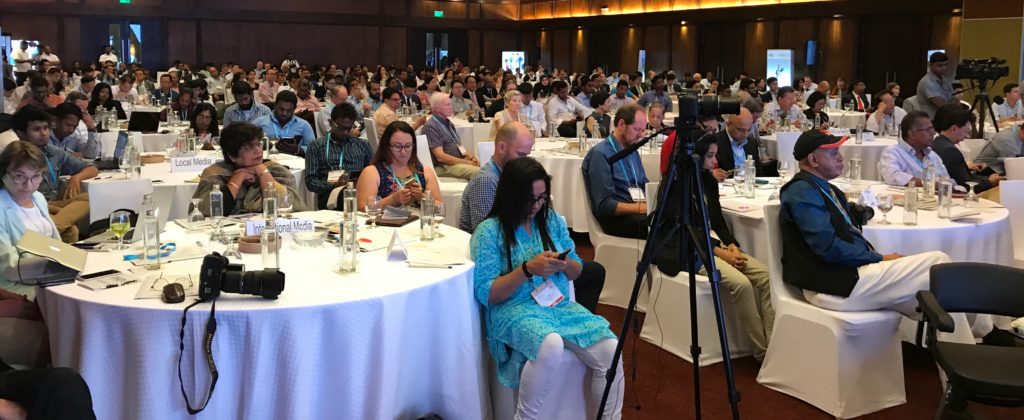
Delegates at the opening ceremony of the PATA Annual Summit 2017
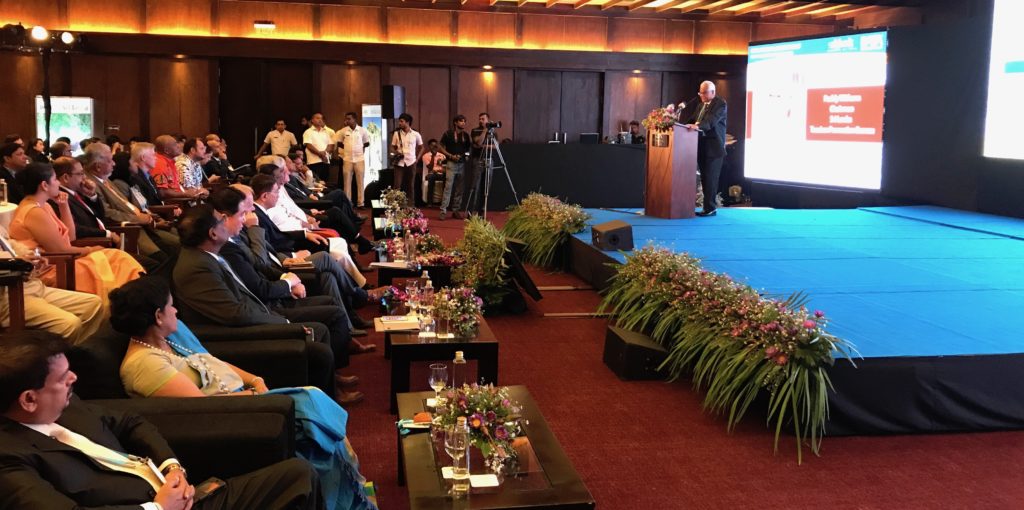
The opening ceremony under way
Reflecting its theme “Disruption, Innovation, Transformation”, the summit was crammed with issues of interest to the young generation. On Days One & Two, millennials in their 20s and 30s technobabbled about how mobile phones and social media are revolutionising travel. On Days Three & Four, the “oldies” spoke up in the chapter and board meetings. Drawing upon past experience, they offered reminders of the past and guidance for the future. In accordance with Mr. Hardy’s commitment to promoting transparency, all the meetings (except those of the Executive Board and the Finance Committee) were open to the media.
The three imbalances
The first imbalance was related to the dictum: Think Global, Act Local. The official opening day, May 19, was the 8th anniversary of the day Sri Lanka officially declared an end to its deadly 26-year internal war. Since then, it has been striving to exploit the peace dividend, with travel & tourism playing a stellar role. But, apart from a brief mention in the opening speech by Mr. John Amaratunga, Minister of Tourism, Lands and Christian Religious Affairs, one of the great travel & tourism stories of this generation failed to be adequately shared with the young generation. Both PATA and the Sri Lankan hosts lost a valuable opportunity to make the summit a conduit for peace, and rally the millennials to a much bigger cause.
The second imbalance was that the conference programme was overly dominated by techies, many of whom are PATA sponsors and strategic partners, and get priority for speaking slots. But, as the transition within PATA itself makes clear, equally as important is the onset of ageing societies. Moving just as fast, this demographic tsunami will also disrupt and transform travel, forcing innovation in everything from the design of hotel rooms and transport systems to a boom in retirement homes, travel by the physically challenged and health & wellness facilities. None of these trends were on the PATA summit agenda.
The third imbalance was within the programme content. Technobabble is becoming repetitive and boring. Only the venues change. Travel & tourism events are becoming clones, with little differentiation. Technology may be greasing the wheels but it is also plagued by debilitating side-effects such as privacy infringement, cyber attacks, ransomware, fake news, the impact on jobs, danger of drones, fraudulent travel websites, identity theft and more. PATA members need guidance through all this, too, but none of it was on the PATA summit agenda.

Q&A, the sli.do. way. The questions can be seen on either side of the main screen.
One mixed-result impact of technology could be clearly seen. All Q&A sessions were switched from high-touch to high-tech via an app known as Sli.do. Gaining popularity on the conference circuit, the app allows questions and comments to be sent via mobile phones. These show up on the screen, leaving it up to the moderator and panelists to respond as they see fit. While it blocks out boring questions and rambling commentators, it also eliminates all audience contact. Said Peter Semone, chairman of the PATA Industry Council, “It dehumanises the event. It has its uses but there is no interaction.”
The “oldies” speak out
Many of the high-tech presentations will be posted on the PATA summit website, so this editor will not report on them. More interesting were comments by the outgoing generation, whose presence at the PATA events is dwindling by the year. This year, many of them spoke out.
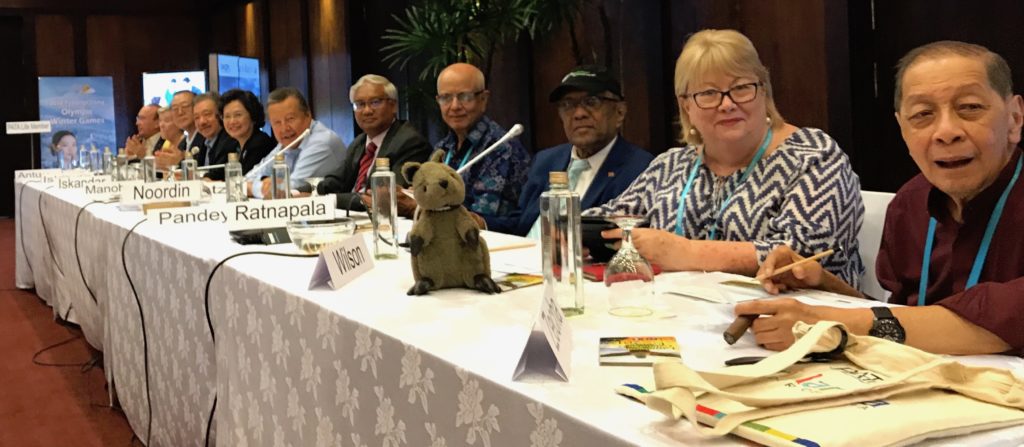
The line-up of life members at the board meeting.
In the Chapters Colloquium, Ms Margaret Wilson, Western Australia Branch Manager, Australian Tourism Export Council, gave a history lesson. She reminded the chapters of one of the main reasons for PATA’s downfall in the years after the historic move to Asia in 1998 – the decision to force chapter members to become full PATA members. That disastrous move decimated PATA by forcing out thousands of mom-and-pop shops, the ambassadors of PATA. Dozens of chapters shrank and disbanded. PATA lost a massive grassroots movement and formidable range of resources for publicity and networking. No-one was held accountable.
Ms Wilson, 69, and now chairman of the PATA Honours Committee, reminded the delegates that the once formidable chapters were also a good source of business for Asia, which was then on the receiving end of tourism flows from North America, Europe, Australia and Japan. Today, she said, “I don’t think anyone even knows the rules to start a chapter.” She asked if anyone in the room did. No hands went up. “That proves my point,” she said. “We all need these new technologies but some things in the past worked.”
Another 30-year veteran of PATA, Mr. Wong Soon Hwa, spoke up twice. The only “oldie” featured in the tech-dominated first half of the summit, he made a presentation on Blacklane, a company that offers limousine services. Comparing his product to other tech-driven transport services such as Uber, he said, “Not everything is designed for the millennials.”
He spoke up again at the Chapters Colloquium in his capacity as chairman of the Singapore chapter. He said he could speak more freely after having turned 60 last year. “You can speak from the heart, you can be less politically correct. Some people may like what you say and some not. But who cares.”
He outlined how he had facilitated a demographic transition in the Singapore chapter. All executive committee members were asked to step down and replace themselves by nominating a millennial. At first, he thought it would not work, given the influence of egos and the politics of asking long-standing friends to vacate their positions. But no, he said, they all agreed. Now, a new generation, all under 50, has taken over and the old guard has become an “advisory council.” The new team has a better mix of professions such as hoteliers, travel agents, academics, as well as gender balance. He said they want to be a “HIP team”, defined by Humility, Integrity and Passion, not about power and glory. As a further incentive, those serving in the chapter executive committee don’t pay membership dues, while the advisory council members pay only 50pc of dues.
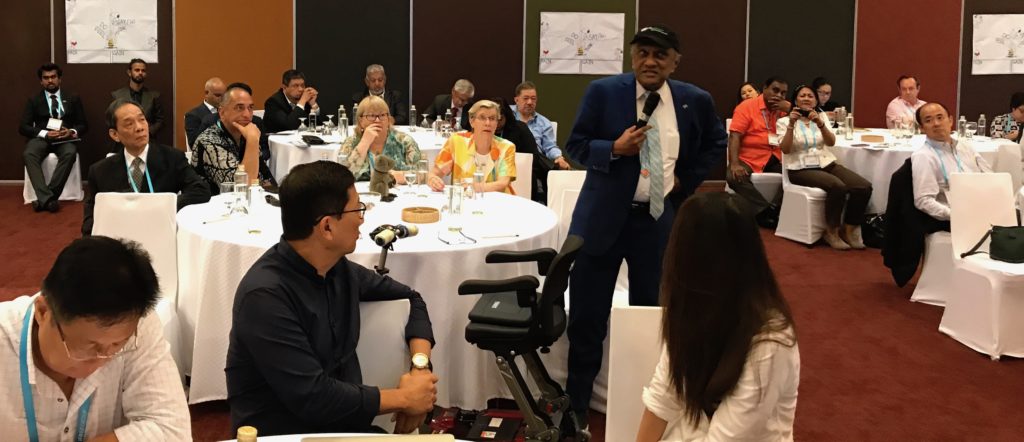
Former PATA President and CEO Lakshman Ratnapala making his point at the chapters colloquium. In the dark shirt in front is Wong Soon Hwa of Blacklane.
Another life member who attended the summit was former PATA President and CEO Lakshman Ratnapala, now 80. Attending his first summit since PATA moved to Bangkok in 1998, he noted that under his watch, and dating back to his earlier days as VP for Chapter Relations, PATA had expanded chapters all over the world including Latin America and the former Soviet Union. He advised chapters to become self-reliant, not to ask for visits by the CEO and/or chairman and not to constantly seek help from the HQ. The most important thing, he said, is for the chapters to have dynamic leadership. If that exists, the rest will follow.
Value of history
The value of history again emerged during the Board meeting when former PATA chairman and life member Alwin Zecha, now 81, blocked a resolution that would have extended the term of the PATA chairman from one to two years.
The rationale behind the PATA proposal was that a two-year term offers the elected officers more time “in which to execute and implement the objectives and plans, as directed by the Executive Board and Board.” It argued that continual change of officers “does not provide for consistency in governance and requires Management to constantly adjust to different personalities and styles of interaction and supervision.” As it takes some time to become familiar with PATA governance, policies and procedures, the change will allow each Officer to maximise their efficiency and effectiveness in support of PATA goals and objectives.
Mr. Zecha stepped in to say that it was not the job of the elected officers to “execute and implement” PATA’s goals and objectives. That was the job of the CEO. Speaking in his capacity as “someone who has been around PATA longer than anyone else in this room,” he said that if PATA intended to create an “Executive Chairman” position, with a two-year term, then the post of CEO should be eliminated. He suggested that the chairman’s job was largely ceremonial and should remain so, and that PATA should avoid taking any action that would perpetuate the image of it being an “old boys club.”
The motion aroused some interesting discussion but eventually went Mr. Zecha’s way. Not without a dash of humour, though. Referring to Mr Zecha’s favourite preamble, “In my humble opinion…”, Mr Ratnapala said he agreed with everything Mr Zecha was saying except one point. “I have known Alwin for a long time, but I have never known him to be humble in his opinions on anything.”
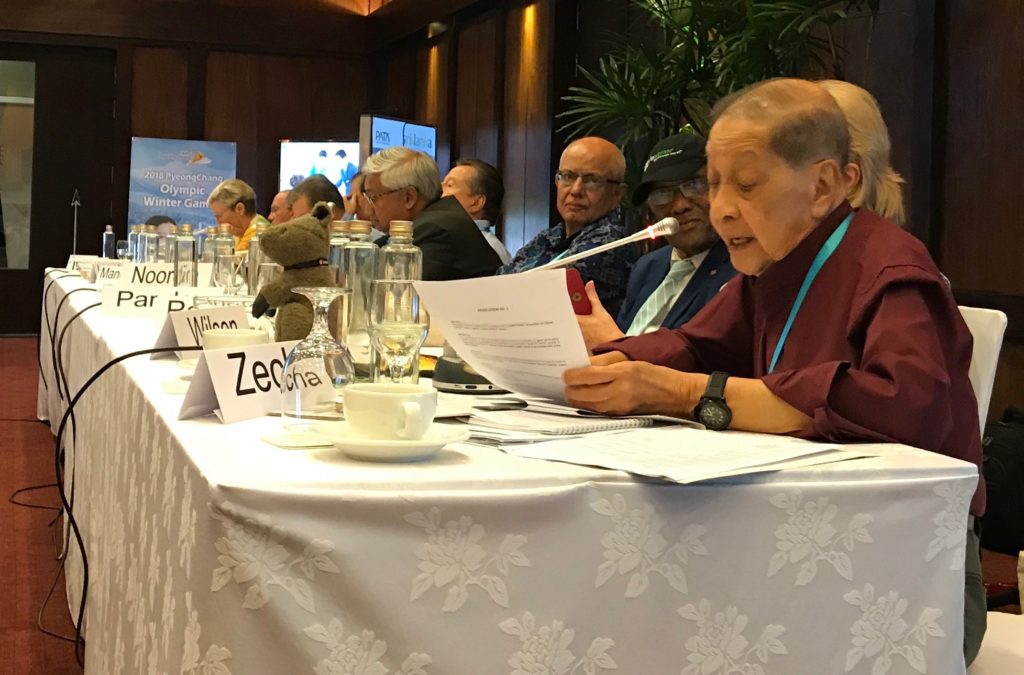
Mr Alwin Zecha in action at the board meeting.
Another issue that got two senior Board members’ goat was an effort to get PATA endorsement for common standards and tools to evaluate animal welfare conditions at elephant camps. Although proposed by the PATA Sustainability & Social Responsibility Committee, the resolution was blocked by Luzi Matzig, 68, Group CEO of Asian Trails, and Basant Mishra, Executive Chairman at Temple Tiger Green Jungle Resort, Nepal, who is in late 60s. Both objected to the PATA resolution. Mr. Mishra said taking care of the elephants was a given in his lodge. Given their voracious appetite, it costs thousands of dollars a year to feed and sustain each elephant. If the elephants were not well taken care of, no-one would come anyway.
Another former PATA chairman Mr. Hiran Cooray, 54, also spoke up on sustainability issues. He said that his late father, Herbert Cooray, the founder of Jetwing travel group, had built the entire business on the principle of People, Planet, Profits, long before it became a buzzword slogan. If travel companies did not take care of their people and the planet, they would not make any profits, and vice versa. He noted that Jetwing hotels were the first in Sri Lanka to have water treatment plants. Its people had been taken care of in the worst years of tourism downturn when Sri Lanka was wracked by internal conflict.
He also highlighted PATA’s pioneering role in sustainability issues dating back to the PATA annual conference in Bali in 1991 when environmental activist Dr David Suzuki delivered the keyote speech. All the PATA summit delegates who stayed at the Jetwing properties found a biography of the late Herbert Cooray, widely hailed as one of the visionary pioneers of Sri Lankan tourism, in their rooms (see cover of the book below).
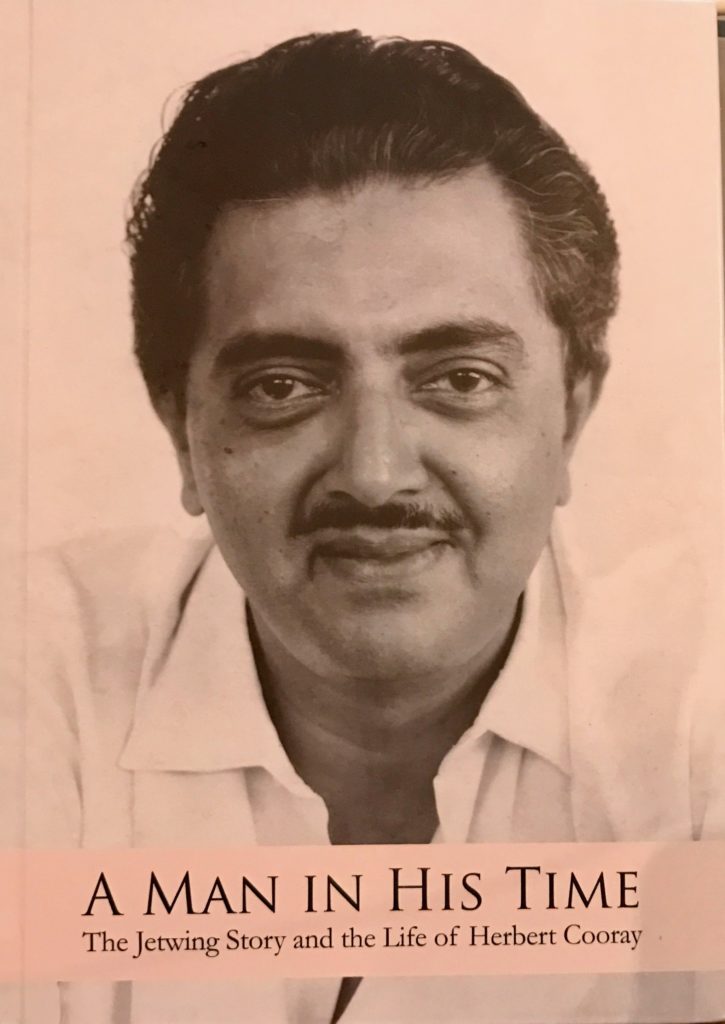 Herbert Cooray, founder of the Jetwing Group of Sri Lanka, and father of…. |
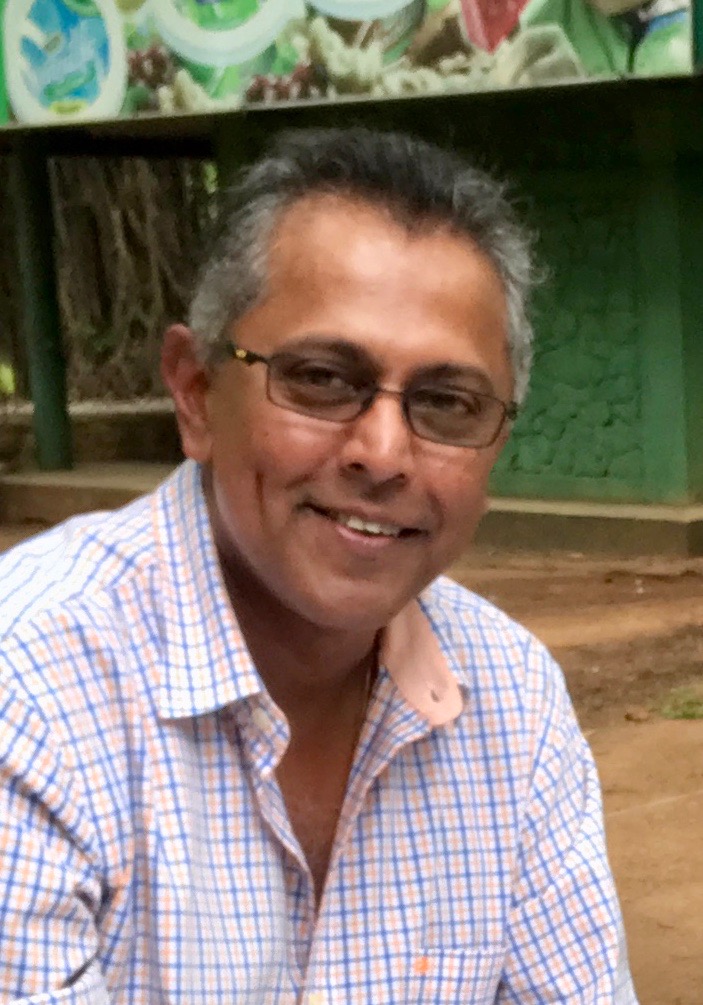 ….Hiran Cooray, Chairman of Jetwing Hotels, and former PATA Chairman. |
New PATA chairman Sarah Matthews of TripAdvisor, 47, is the third woman to head PATA after Janice Antonson of Canada and Phornsiri Manoharn of Thailand, but she is also the youngest. Admitting knowing little about the history of PATA, she said she had spent a lot of time with the life members listening and learning from them. She said she wants more gender balance in the association. and would like more women to speak up.
Conclusions
The final session of the PATA summit was the Insights Lounge which featured more technobabble. Mr. Rafat Ali, CEO/Founder, Skift moderated a panel that included representatives of What3Words, Beautiful Destinations, IATA, Boeing, TripAdvisor, Microsoft, comScore and ForwardKeys. Delegates heard more of the same. Some focus shifted to security, especially monitoring the impact of crises on destinations by ForwardKeys and IATA’s efforts to set up seamless technological solutions. All well and good, but Mr. Ali indicated the solution may lie at higher level. “What can technology do about Donald Trump?” he said. No answer.
Mr. Hardy gave the Board a detailed briefing on more technological innovations to come, gleaned from his participation in a high-powered course at Singularity university. The tech revolution is only just beginning, which means PATA will have its hands full for years. Today, simple cameras can tell great stories and attract social-media eyeballs worth millions of dollars, ending the days of mass-marketing campaigns via legacy media. New websites still to come will disrupt both tour-guides and tour-operators. One speaker let slip that “Google is collecting a lot more information about you than you can imagine.” Other things like Artificial Intelligence, “predictive analytics” and “engagement analytics” are being nurtured in innovation labs. But there are also dangers: Selfies kill more people annually than sharks, one speaker said.
Dr Chris Botrill, Chairman of the Human Capital Development Committee and PATA Vice-Chairman, reported on PATA’s annual Youth Symposium which is attended by students of tourism from various Sri Lankan educational institutes. He said the emerging generation of students wants balance between technology and ecology. Virtual reality was just as important to them as zero-carbon footprints and the well being of host communities. They recognised the multi-culturalism of our world today, and felt that high-touch should not be lost in the pursuit of high-tech.
All those agenda items are framed within the far wider geopolitical, economic, social, cultural and environmental changes under way. One speaker warned of the growing backlash against tourism in places such as Barcelona and Venice, the upcoming perils of “over-tourism and commodisation.”
If PATA is to be a guide and thought-leader to shepherd the membership flock through this thicket of agendas, it will need more comprehensive navigation aids and a clearer roadmap. Operating within the constraints of its own financial and staffing resources, it will also have to depoliticise the association, restructure and reform many of the time-wasting committees and councils and prevent the “old boys club” of PATA cronies from being replaced by a “new boys club” of millennial cronies.
The bottom line will still need to be focussed on what Dr. Taleb Rifai, Secretary General, UN World Tourism Organization said should be the over-arching agenda: To make the world a better place. In line with the UN Sustainable Development Goals, how can travel & tourism alleviate poverty, combat corruption, promote good governance, health and education. He said travel & tourism has become one of the world’s fastest growing industries, but with “growth comes power and with power comes responsibility.” Now that the centre of gravity has moved to the Asia Pacific, “PATA is a global power,” Dr Rifai said.
Perhaps not just yet, but by the end of Mr. Hardy’s second three-year term in 2020, it could well be.



Liked this article? Share it!